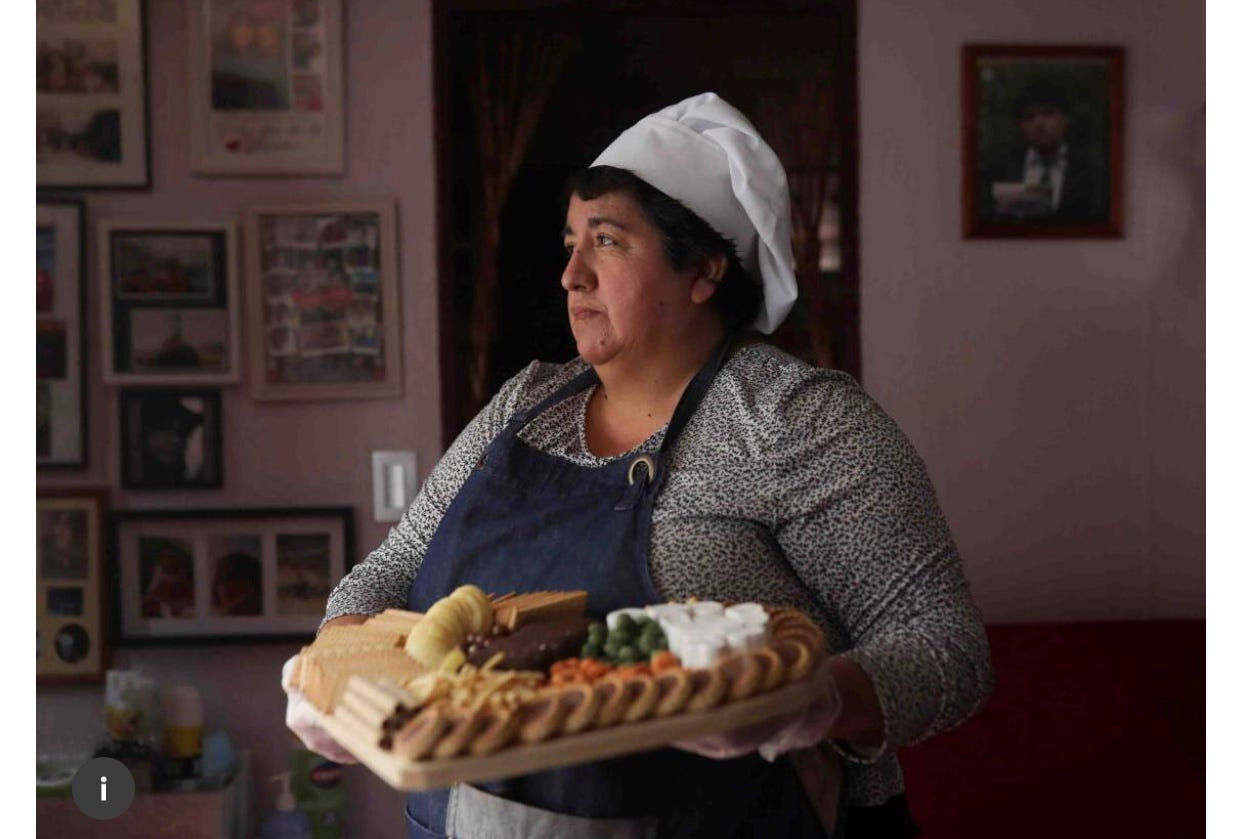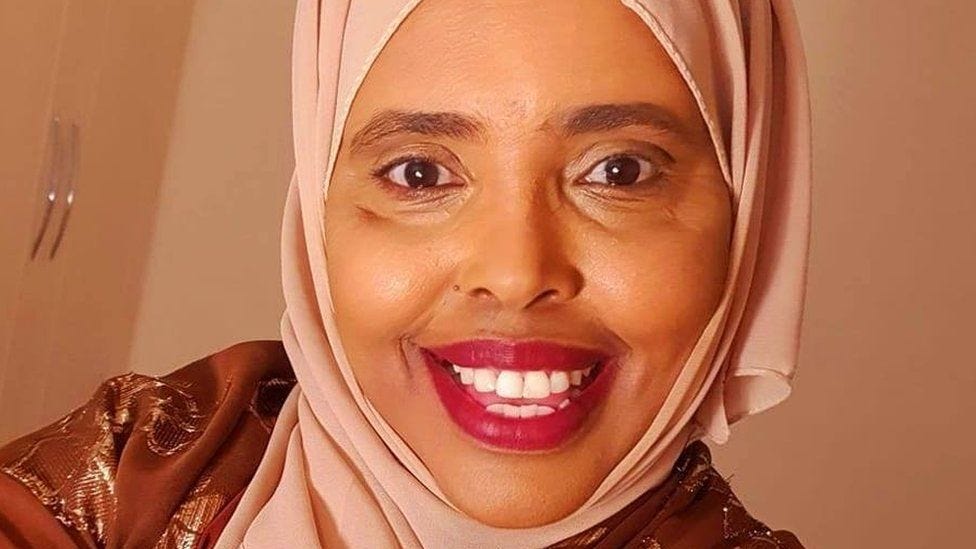Global Roundup: Latin American Mothers Impacted by Pandemic, Protesting Anti-Gay Hate Crime in NYC, Somali Social Worker Targeted Online, Two-spirit Indigenous Film, Women in Public Spaces in India
Compiled by Samiha Hossain
Rosa Navarro, 52, holds a tray with the breakfast she prepares to sell, after restrictions due to the coronavirus disease (COVID-19) affected her work, in Santiago, Chile September 7, 2021. REUTERS/Pablo Sanhueza
Women in South America have taken the biggest employment hit since COVID-19 according to the United Nations Development Program. Women often work in sectors most impacted by the pandemic, including tourism, commerce, and education. In addition, they have taken the brunt of unpaid domestic work and care-giving, which has increased due to school closures in the region.
Mothers in two-parent households are the least likely to return to work outside the home, while single mothers - though hit hard initially - have seen a sharper rebound in employment and labor participation.
Everything changed with the pandemic. I had my vehicle and I kept doing it until there were no more classes. Then I stayed home with my kids, who have virtual classes every day, and now we depend on my husband's work. - Rosa Maidana, a 45-year-old mother of three children and bus driver
Single mothers on the other hand, have no choice but to find work. Rosa Navarro, a 52-year-old Chilean with seven grown children, had to reinvent her events business with 20-member staff to selling breakfasts and lunches when tough restrictions came into effect.
I am single, I do not have a husband to help me. My children give me a hand, but we were very affected. - Rosa Navarro
Time and time again women and mothers have to make difficult decisions during crises. When we think of “economic recovery,” it’s important to be critical of how marginalized groups are often left behind despite being disproportionately affected.
--------------------------------------
Erik McGregor/Getty Images
Abimbola Adelaja and his friend were violently attacked and robbed at night while they were buying sandwiches. The attackers were also shouting anti-gay slurs. Both Adelaja and his friend were injured but are in stable conditions.
As news of the attack spread across the country, a rally for the two men was held outside the site where they were attacked, before turning into a march through the Brooklyn neighborhood. The protest was organized by Qween Jean, the founder of Black Trans Liberation, and activist Gia Love – a close friend of Adelaja.
There has been an increase in violence targeting the LGBTQ+ community across the US. In New York, there has reportedly been 64 anti-gay hate crimes so far this year, which is three times more than the number of bias attacks at the same point in 2020.
Adelaja states that one of the most horrific aspects of the incident was the inaction of the bodega employees. Adelaja even had to flag down an ambulance himself.
I wasn't expecting them to get involved or jump in. But certainly getting the phone or calling the cops for me or making sure I was OK are all things that could have been done. - Abimbola Adelaja
It is unconscionable that the LGBTQ+ community is seeing a rise in such horrific violence, and in many cases are not helped when needed. Protestors want to make it clear that they are not afraid and will continue “living feely and proudly.”
-------------------------------
Hanna Paranta via BBC
Hanna Paranta (known as Hanna Abubakar online), is a social worker who helps rape and domestic violence survivors via her Facebook page where she has over 130,000 followers. Paranta says her work has been targeted in a coordinated mass attack and Facebook has not responded to her concerns effectively.
Paranta’s Facebook page has frequently been disabled or restricted by the social media company and she believes those behind the complaints want to shut her down completely. She says Facebook has been unable to identify and regulate these false reports.
A supporter of Paranta sent her screenshots from a private group of over 300 members that are targeting and reporting people. Some of the screenshots showed people discussing how they had succeeded in restricting Paranta's Facebook page and planned to remove her YouTube account. She was frustrated that Facebook had disabled her account without seemingly investigating the reports first. She also claims to be shadow banned.
Many of those actively reporting Paranta's page are women who have been groomed online and made to believe lies about Paranta.
I believe if this continues someone will be hurt...These groups will hurt other vulnerable women. - Amina Musse Wehelie, journalist and mental health advocate
Paranta and Wehelie believe that Facebook should employ more Somalis, so they can properly do translations for the fake reports to be investigated.
Paranta is doing important work in the Somali diaspora. It is deeply concerning that her work is being interrupted by those harassing her and that Facebook has not been doing enough to support her. Activists, particularly those of marginalized identities, are too often targeted for their advocacy and harassed online. Social media companies should work to mitigate these issues.
------------------------------
"Wildhood" (Riley Smith)
Bretten Hannam is a Two-Spirit, non-binary Mi'kmaq person, whose film Wildhood is having its World Premiere at the Toronto International Film Festival this week. The film is about a Two-Spirit Mi'kmaq teenager and his young brother fleeing their abusive father and searching for their absent mother. Along the journey, they meet other Indigenous folks who help them. It is a film about community, family, sexuality and Indigenous identity. Salon interviewed Hannam about Wildhood and the Two-Spirit and Mi'kmaq communities.
As I started to make short films, they were inherently queer or Native Indigenous stories, and as I figured out my identity and my community, and where I fit, there were a lot of dissenting voices from different directions — "You can't do that" — and that makes me want to prove them wrong. - Bretten Hannam
Hannam says that they wanted to create rounded characters that are “real and complex and occasionally contradictory.” They wanted to counter the idea that Indigenous and queer characters have to always be “sad” or “hard.”
The Mi'kmaq approach is more holistic than separate labels and separated out parts of an identity. Two-Spirit identity is an intersection of the relationship to land, gender, sexuality, ceremony, and culture. - Bretten Hannam
Hannam also discusses how the film is not a coming out story but rather the main character finding his identity and discovering the world around him. Hannam wanted to challenge mainstream notions of masculinity and the colonial idea of man and woman.
Who has more courage and bravery in them to be themselves? Is it the straight-acting or appearing musclebound hunk guy or the effeminate guy marching to his own fucking tune? There's one that is going to get shit but continues on, and one who passes and continues lives life undisturbed more or less. - Bretten Hannam
---------------------------------
Dr. Indu Antony and her 76-year-old female companion are trying to address the safety of women in public spaces in India through their artistic dialogue titled Cecilia’ed Always. Her art project explores public places through a feminist lens. They are challenging the ideas that public spaces are male spaces. Feminism in India spoke with Dr. Indu about the challenges she faced while addressing women’s safety in public spaces through art.
Dr. Indu was inspired to talk about this topic because it is a pressing concern that is rarely talked about. The model for this project – Cecilia – is a 76-year-old woman Dr. Indu has been friends with for several years. They bonded over their similar feminist interests. For the project, Cecilia dresses in colourful and remarkable outfits; comes in fancy cars and enters the streets that are considered unsafe for women.
The idea was to transform [Cecelia] into a celebrity and photograph her in an unconventional, stylistic manner. The reason for this aesthetic is that when a celebrity or politician appears in public, they become the centre of attention. By transforming Cecilia into a celebrity who would enter the streets in a car, the intention is to draw people’s attention to start the discussion. – Dr. Indu
Cecilia’ed Always consists of over 70 shoots organized in open bars in Bangalore. They invited more women to meet at “shady” bars, and discussed why these bars are called “shady” in the first place, especially for women. They have conducted workshops, awareness sessions and interviews with women from diverse backgrounds who discussed the problems they faced in public spaces as well.
I believe that revolutions don’t happen overnight and it takes time to bring change. Likewise, even this project will take time to sink in. Though people have started talking about it and many women have come forward to discuss their problems, this is just the beginning, indeed there is a long way to go. – Dr. Indu
Samiha Hossain (she/her) is a student at the University of Ottawa. She has experience working with survivors of sexual violence in her community, as well as conducting research on gender-based violence. A lot of her time is spent learning about and critically engaging with intersectional feminism, transformative justice and disability justice.
Samiha firmly believes in the power of connecting with people and listening to their stories to create solidarity and heal as a community. She refuses to let anyone thwart her imagination when it comes to envisioning a radically different future full of care webs, nurturance and collective liberation.








